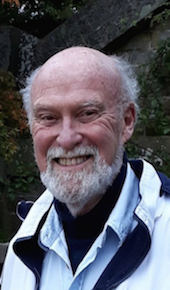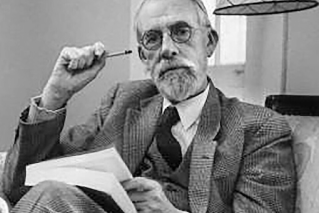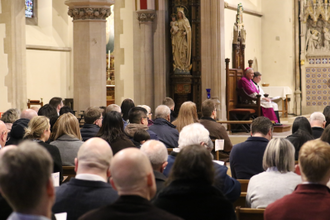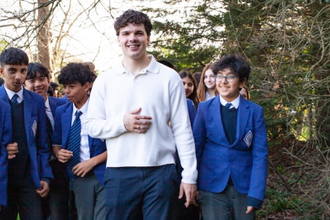Saint Dominic's Mission

Professor Ian Linden
Not many democratic organisations without fanfare of trumpets can, and have, celebrated a 800th Jubilee. In August 1221, thirteen Dominicans, a good apostolic number led by the well-connected Gilbert de Fresney, landed in Kent and set off for Oxford. This month four young English Dominican friars have been marking the anniversary by walking the same route from Kent to Oxford back to the priory in St Giles, to arrive on 15 August 2021.
Groups of 'Black Friars' (after their distinctive black cape worn over a white habit) were already established in Paris and Bologna when the twelve reached Oxford in 1221. At the time these three great mediaeval universities were attracting the best teachers and students in Europe. The Oxford Dominicans were not just there to satisfy their intellectual curiosity but to promote Catholicism both philosophically and theologically and to grapple with Christian heresies, Judaism and Islam as required by the Order.
Part of the staying power of the Catholic Church is its ability to allow innovative religious communities to flourish in response to different historical needs and sensibilities- provided they acknowledged, or finessed, papal authority when disputes arose. The mission of the newly formed Order of Preachers, the Dominicans, was to marry faith with reason - which Pope Benedict XVI described as having 'a natural harmony' - and to respond in the simplicity of their lives to the poverty around them. The great Summa Theologiae of the 13th century Dominican, Thomas Aquinas, was intended as a compendium of Christian thought, all that any peripatetic friar might need to win the arguments and convert by reasoning anyone on the wrong path, especially those in the new towns and cities.
All very well, you might say, but what about the Spanish Inquisition, the fanatical Cardinal and friar, Torquemada, and the torture of heretics. Not much to celebrate here apart from their role in Monty Python sketches. Dominic's own approach to the Cathars (Albigensians) in Languedoc - they believed the body and material world was evil and only the soul good - had been one of example through way of life, preaching and reasoned debate. The Pope charged the Dominicans and Franciscans with the task of inquisition only in 1231, ten years after St Dominic's death. By then, however, the Church was already dealing with deviation from Catholic doctrine by fear and violence, for example in the Albigensian Crusade (1209-29. In the late 15th century the Pope appointed Torquemada as the Grand Inquisitor for a Spain now led, post-Muslim defeat, by its Catholic Kings.
Across the Atlantic one of the next generation of Dominicans, the Spanish priest, Fray Bartolomé de Las Casas, was pleading for recognition of the humanity and rights of Native Americans before the Spanish King, Charles 1st, and winning the argument. The Dominican Order weren't and aren't monolithic. Nor were they always in the corridors of power. Between the years 1538 and 1540 Henry VIII confiscated every single one of Britain's 57 Dominican houses. **
Fast forward to the 20th century and I will never forget my visits to the Dominicans' radical Johannesburg priory in the - ironically - named Mayfair district. In the 1980s Mayfair was surprisingly multi-racial. Everyone was poor or down-at heel not just the blacks. The local South African Dominicans had set out to find a suitably decrepit property, fitting their voluntary poverty (hence the name mendicant Orders) to their ministry to the poor. A gleeful estate agent was astonished to get the building off his hands.
Albert Nolan OP, a South African born in Cape Town and a former university chaplain, made the priory a sanctuary for Christian and other supporters of the banned African National Congress, dealing with their everyday problems and exploring the spirituality that would sustain them through surveillance and probable arrest by the apartheid system. His vision of the Dominican vocation of preaching included participation and leadership in the influential and ecumenical Institute for Contextual Theology - influential enough for the apartheid propaganda machine to denounce it as the work of the Devil and the priory to get shot up. He was also the editor of Challenge, a popular and radical newspaper for the country's grassroots Catholic communities. His 1972 book Jesus before Christianity presented to a secular world a radical historical Jesus in the context of the time. It could be seen as a South African approach to liberation theology and narrowly missed censure from Rome because of its - unsurprising - failure to mention the Church.
In 1983 the global Dominican community showed how much they valued Albert by electing him Master-General of the Order - but only for a few hours. When he asked their permission to decline the honour in order to pursue his ministry in Johannesburg and the struggle against apartheid, they voted on it and agreed. In 2003 he was one of the first to be honoured by Thabo Mbeki's government with the South African Order of Luthuli. And after publishing several ground-breaking books of theology, in his late eighties, he is now retired.
What then of Blackfriars Oxford now home to Timothy Radcliffe, another great exponent of the Dominican tradition in his preaching and writing and former, much-travelled Master-General of the Order. Blackfriars present mission is very much the one envisioned by its 1221 founders. Attached to the priory is a Private Hall of the University owned by the English Province and base for Blackfriars Studium noted for its theology and philosophy but also its diversity of students, teachers and postgraduate degrees. The Las Casas Institute of ethics, governance and social justice and the Aquinas Institute, part of the work of Blackfriars Hall, reflect the great names of Dominican history as well as promoting contemporary Catholic social and philosophical thinking pioneered most famously in the 20th century by Vincent McNabb (1968-1943) and Herbert McCabe (1926-2001).
There is something very attractive about the mission-oriented democracy of the Order and its commitment to the natural harmony of faith and reason, combatting the drift into the emotion-led catastrophes of our political world. The Dominican motto: contemplare et contemplata aliis tradere (to contemplate and hand on to others the fruits of contemplation) beautifully summarise their approach. When you come to think of it, quite a good motto for humble bloggers too.
** Richard Finn's history The Dominicans in the British Isles and Beyond will be published by Cambridge University Press in 2022.
Professor Ian Linden is Visiting Professor at St Mary's University, Strawberry Hill, London. A past director of the Catholic Institute for International Relations, he was awarded a CMG for his work for human rights in 2000. He has also been an adviser on Europe and Justice and Peace issues to the Department of International Affairs of the Catholic Bishops Conference of England and Wales. Ian chairs a new charity for After-school schooling in Beirut for Syrian refugees and Lebanese kids in danger of dropping out partnering with CARITAS Lebanon and work on board of Las Casas Institute in Oxford with Richard Finn OP. His latest book was Global Catholicism published by Hurst in 2009.
Visit his website here: https://www.ianlinden.com


















